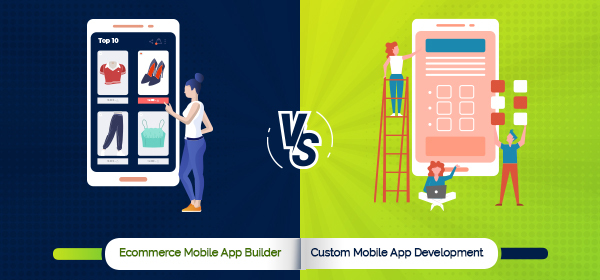Businesses across the globe are witnessing digital transformation like never before. Be it automation, healthcare, real estate, or any other industry; technology hasn’t left any untouched. One of the first things that come to mind when talking about digitally transforming any business is a website. The other thing is a mobile app.
Yes, a mobile app has become an inseparable part of any business thinking of expanding digitally. Be it a small business or a big enterprise, a mobile app must-have for both. Now, the question here is this – which kind of mobile app to have for a business?
If you are a small business owner and are thinking about starting, this post can help you. In this post, we’ll explain how to pick the right way to develop a mobile app for your business. By the end of this post, you’ll understand whether to go for a ready-to-integrate app solution or a custom-built approach.
You’ll also learn which way to go for your business, budget, and other factors to maximize profitability.
How to Pick the Right App Development Approach
Digital consumption is leaning largely towards mobile devices. When it comes to developing a mobile app, there are several options to choose from. You can either choose an off-the-shelf ecommerce mobile app builder for mobile app development or choose to build a custom mobile app.
Note: You can also go for customizing the launch-ready app solution – a midway.
1. Ecommerce Mobile App Builder – An ecommerce mobile app builder is a cost-effective and time-saving alternative to develop a mobile app. An ecommerce mobile app builder requires almost little to no coding, which proves advantageous for those from a non-technical background.
There are many ecommerce mobile app builders available in the market to choose from. Most of them provide you with a ready-to-integrate app development framework for you to configure as per your business logic. This kind of ecommerce mobile app builder comes with a comparatively shorter development cycle and a lower time to market.
2. Custom app development – If you need a more complex and business-specific app, custom app development works better. This is because the more complex the app, the more is the need to work specifically on building your app exactly as per your business needs. This means the ready-to-integrate m-commerce app builder may not provide the development features that you require.
The development and resources you require are more for the app development, but the app you get after hiring professional developers is the best.
There are a few questions that you should ask yourself before deciding on whether to go for an ecommerce mobile app builder or a custom-build approach.
1. What kind of app do you need?
The first thing you should decide is whether you want a fully native app that is compatible with all the native platforms – iOS, Android, or a hybrid (or cross-platform) app.
If you want a fully native app, a custom-build approach would be more suitable for you. If you want a single cross-platform app, an ecommerce mobile app builder would be a more suitable approach.
2. How Responsive Do You Want Your App to Be?
The performance of a mobile app also depends on developers’ skills and the technology stack you use. In the custom-build approach, developers choose the right technology stack that suits your product type and ensures maximum performance output, staying with the latest technology trends. The app thus developed is highly responsive.
In case you want your app to be one-size-fits-all, you can go for an m-commerce app builder. Though this approach may sometimes not suit all your business needs, it is a good alternative, especially if you are tight on budget.
3. What Design Elements Do You Require?
In the custom-build approach, mobile app developers can design a unique user interface for your mobile app. They can hand-code the app’s interface to make it 100% fit for your business requirements. In case you want something unique, a custom-build approach is a better choice.
If you want fast development but aren’t equipped with technical expertise, an ecommerce app builder for Android/iOS can be better. This is because an ecommerce app builder for Android or iOS also offers quite a good range of templates, navigation styles, and UI options to choose from. Further, the design elements are mostly drag-and-drop which makes it easy for even technically limited resources.
4. What All Resources Do You Have?
Choosing between an ecommerce mobile app builder and custom app development also depends on the availability of resources. If you have a good team of technical experts and a decent budget, you can always go for custom development.
If you have just started your business, and don’t have a big team of developers, and can’t outsource development due to budget constraints, an m-commerce app builder can be a better choice. You can also customize the features of the ready-to-integrate app builder frameworks as per your business logic later on.
When it comes to developing an app, both the app builder and custom development are pretty popular. However, which approach you choose depends on one main factor.
This is the rule of thumb that most businesses follow.
While big enterprises pick the option of custom mobile app development from scratch, small and medium-sized businesses pick the option of an off-the-shelf ecommerce mobile app builder or customize the configurable m-commerce app builder solution.
There are several ways an m-commerce app builder can have the edge over the custom-build approach. Let’s discuss them all one by one.
1. No Need for Coding Skills
When you choose an off-the-shelf ecommerce app builder for Android or iOS, there is no need for you to have a skilled team of developers. The app builder simplifies the development process as it generally works on the What You See Is What You Get (WYSIWYG) approach in most cases instead of coding.
This implies that any change you do in any section is visible in real-time for you to review. Moreover, most of the app builders provide drag-and-drop functionality, which simplifies the app development process.
2. Savings on Budget
If you use an app builder, your app development process costs you much less than the custom development process. This is because you don’t need to hire a team of professional developers or outsource the development process. Further, the testing of the app also doesn’t require more time and money.
You can simply integrate the ready-to-launch app builder framework and build your app at very affordable prices.
3. Lower Time-to-Market
Another advantage that an app builder provides is the lower time to market. While a custom app may take up to several days to get ready, an app builder can help you launch your app in a matter of 3-4 days only. This helps you save time on launching your app and start gaining returns faster.
4. Simpler and More Cost-Effective Maintenance and Support
If you use a custom app for your business, you may require your users to change their mobile devices if you don’t code for older operating systems. Also, the scalability of a custom app is poor. This is why companies often need developers to roll out a new version with each update.
On the other hand, an app builder platform comes with high scalability and customization freedom. The developers just need to depend on the software maintenance support and easily release the updates with minor modifications.
Looking for a ready-to-launch ecommerce mobile app builder for your organization? Our MageMob App Builder for Magento 2 can be the best solution for you. It comes with support for all native features, cross-platform compatibility, and more.
5. Lower Risk of Losses
The more you invest your budget and efforts, the higher are the risks. If you go for custom development for your app, you, of course, can get the best-suitable app. However, if your app doesn’t fit your customers’ expectations or there are some issues, rectifying them can be challenging. It may also cost you more to fix those issues, and the risks of losses are higher if the customers don’t find your app useful.
On the other hand, you can simply develop your app at a minimum budget with an app builder. This helps you experiment, start off with the minimum features, and expand to include others later. It prevents you from putting all your eggs in one basket and risking a massive loss of your investment of money and time. You can analyze the users’ responses, decide on the usability of your current features, and add or remove them later accordingly at any point in time.
6. Ready-Made Architecture
An app builder typically comes with a ready framework where you need not think about various developmental elements. You can simply use the ready-to-use templates, drag and place them where you want, and ready your app.
Use App Builder for Magento – Your Great App Builder Framework
An ecommerce app builder for Android or iOS is a better alternative for start-ups and small-sized businesses. This is because it provides higher flexibility, customization freedom, scalability, and of course, great ROI.
So, if you are a small business owner looking to build your app using an app builder, our MageMob App Builder can be the right fit for you.
It has got all the features that you seek in an ideal mobile app builder, including:
- Quick Launch – You can launch your app within 6-7 days using this ready-to-integrate pre-built app framework.
- Vast Range of Features – The features like one-page checkout, user profile management, social media integration, and more provide your users with the best user experience.
- 100% Scalability – The instant configuration and scalability freedom gives you an edge as you can put together different components as you want to fit your business needs.
- White-Labelling – You can simply develop your app with our app builder and promote it under your brand name and identity.
- Cost-Effectiveness – Instead of hiring professional developers and investing a massive sum of money and efforts, you can launch your app with minimal investment.
- All-in-One – Our m-commerce app builder provides you with access to both native Android and iOS apps’ in a single app.
If our app builder doesn’t fit your business requirements, you can request customizations in it.
All product and company names are trademarks™, registered® or copyright© trademarks of their respective holders. Use of them does not imply any affiliation with or endorsement by them.





